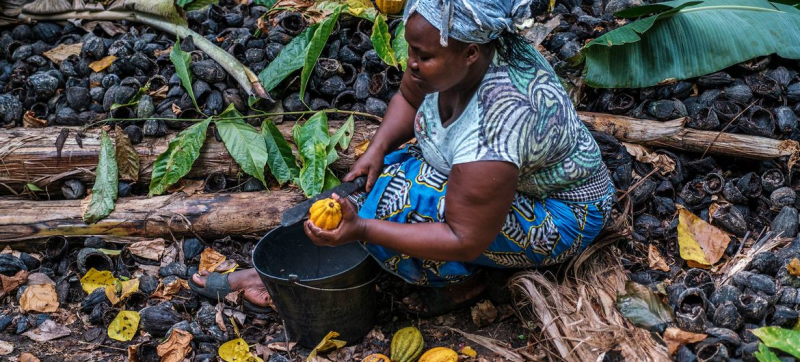- FAO Warns of ‘Silent Crisis’ as Land Loss Threatens Billions |
- Indices tumble on both bourses amid broad-based sell-off |
- BNP Names 237 Possible Candidates for Polls |
- Bangladeshi leader of disabled people of world Dulal honoured |
- UN Report Warns Inequality Fuels Global Pandemic Vulnerability |
$31 Trillion Debt Hinders Developing Nations, UN Trade Chief Says

A woman in Sao Tome extracts cocoa beans from fruits, some of which will be processed for export.
Holding the line on the existing rules-based international trading system remains an essential challenge if the world is to keep a damaging tariff war at bay, a top UN trade official said on Monday.
Addressing UN Trade and Development (UNCTAD)’s 195 Member States in Geneva, Rebeca Grynspan said that 72 percent of global trade “still moves under WTO rules”—a reference to the World Trade Organization, whose agreements are negotiated and signed by trading nations.
“We have, for now, avoided the domino effect of tariff escalation that once brought the world economy to its knees in the 1930s,” Ms. Grynspan told UNCTAD members. “This didn’t happen by accident; it happened because of you, because you kept negotiating when it seemed pointless, defending a rules-based system even as you were reforming it, and building bridges even when they fell.”
‘Impossible choices’
The UNCTAD chief’s comments come amid months of global economic uncertainty and declarations of tariff impositions by the United States on its trading partners.
“A debt and development crisis still faces countries with impossible choices,” she said. “They have to decide whether to default on their debt or on their development.”
Tariffs applied by major economies, including the United States, have jumped this year from an average of 2.8 percent to more than 20 percent, Ms. Grynspan recently told the UN General Assembly. “Uncertainty is the highest tariff possible,” she added, “discouraging investment, slowing growth, and making trade as a path to development much harder.”
Investment drying up
In Geneva, the UNCTAD top economist warned that global investment flows are retreating for the second year in a row, “eroding tomorrow’s growth.”
She noted that today’s investment system favors projects in richer economies rather than developing nations, with one-off costs making one US dollar “three times more expensive in Zambia than in Zurich.”
Ms. Grynspan also stressed that freight costs are now “too volatile,” with landlocked countries and small island developing states facing transport bills “up to three times the global average.”
While AI offers the potential to add “trillions” to global GDP, fewer than one in three developing countries have strategies to capture its benefits. A staggering 2.6 billion people remain offline, most of them women in developing countries, UN data indicates.
Public debt crisis
Echoing Ms. Grynspan’s concerns, the UN General Assembly President, Annalena Baerbock, warned that developing country debt reached $31 trillion last year.
Instead of investing in their people’s future—such as building schools or expanding healthcare—many governments are spending funds on servicing debt.
Trust in the international system is also “eroding,” the UN General Assembly President continued, noting that even though the global economy is worth more than $100 trillion a year, one in two people has seen “little or no rise in their income for a generation.”

